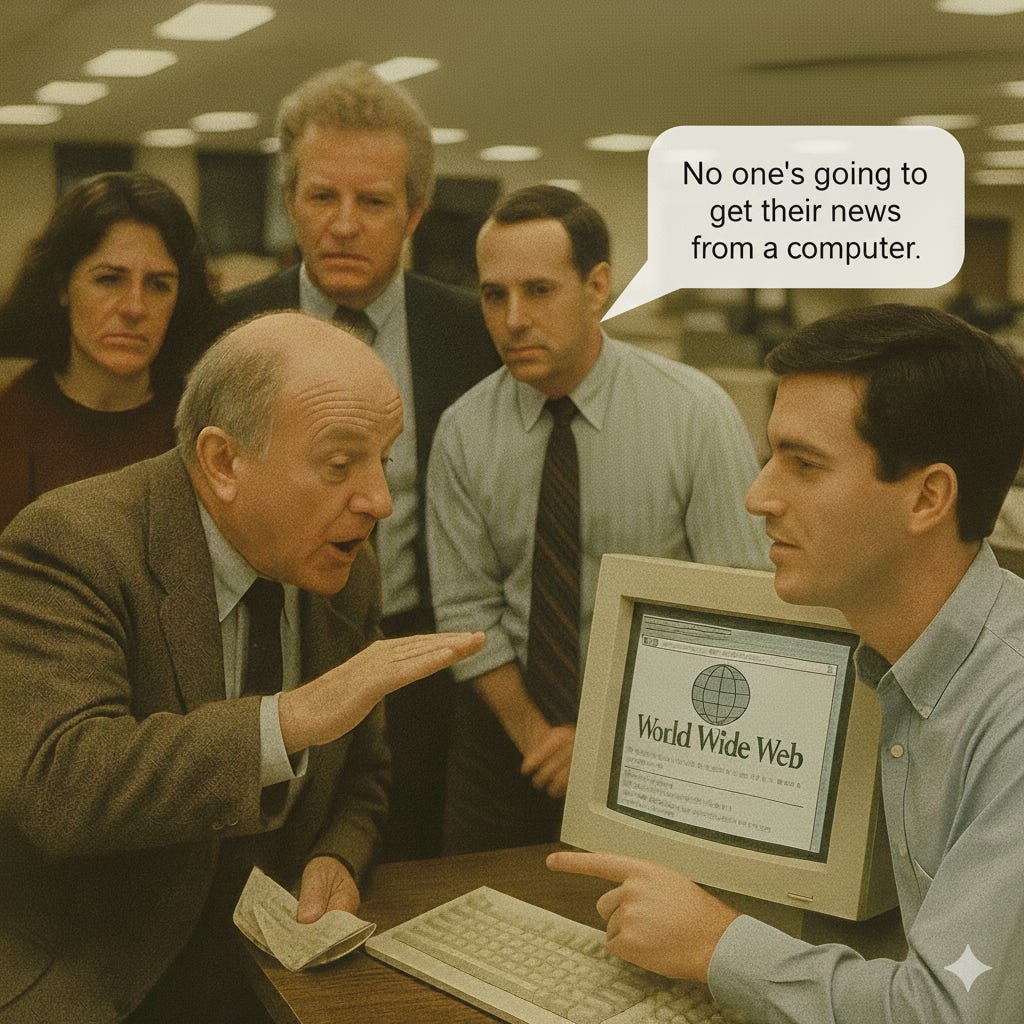Why Not vs. What If: The Sound of Real Disruption.
You know it's real if it makes you angry
I’ve written extensively (sorry!) about how people react to disruption. If you’ve read this blog for a while, you have no doubt heard me talk about “Why not” and “What if” reactions to new things - “why not” being the usual take, but “what if” being the better one.
When something is really disruptive, it’s threatening. When people are threatened, they really only have two choices: either accept the new thing, or reject it. You can think of this in terms of worldview. If something being true would really challenge your worldview, then either you’re dumb/wrong (your worldview isn’t right, you made a mistake) or it is (the new thing doesn’t change the world, the idea that it would is the dumb/wrong thing). The more challenging the new thing is, the stronger this tendency. When something is really disruptive, you see a full bifurcation: some folks are strong advocates, and others think it’s the dumbest thing ever.
That’s where we are right now with AI coding. A project I have been working on got noticed publicly, and there was a good ol’ internet debate about it.1 The debate actually made me happy - I am one of the people that thinks the new thing (in this case, AI-assisted coding at scale) is really cool, very real, and will be very disruptive. It does have problems and challenges to be solved still, for sure, but it seems pretty clear to me (particularly if you follow the tools and conversations closely and try them yourself) that a very powerful, disruptive thing is happening in coding right now.
Seeing the strong debate, with exactly the kind of polarization I expected, just reinforced my feeling that this is real and disruptive. If it were a mirage, people wouldn’t be as energetic about it - they’d be happy to let others waste time on something they’re confident doesn’t matter. And sure, some of the objections raised (testing, security, robustness, brownfield applicability etc) are real, and some of them are hard to solve. But none of them seem impossible, and the trajectory of even the last six months gives a lot of confidence that they will be solved soon.
The reason I write and think so much about disruption and mindset, is that it’s hard to see these things when you are in the moment. It’s really easy to look back and know that “that was the moment it all changed” but for a bunch of reasons, we tend to be slow to change, and we resist things the most exactly when we should be embracing and understanding them instead. This is one of those moments. And as I also wrote, “code goes first”. What is happening with coding tools will start to happen with all kinds of work soon.
If that makes you feel uncomfortable, and you want to reject it, or make it not true, good! That’s a good sign that you recognize how disruptive it really is, and it’s the first step to understanding and taking advantage of the new opportunities in front of you.
I am excited by these new tools. I am getting to do things I haven’t done for years, because it’s too hard for me to pay attention to all of the detail that I now can ask for help with. This has let me just do the part of coding that I always loved - the imagining, tinkering, and making, without all of the mundane, slow, tedious machinery that is needed. My imagination feels completely free!
Human imagination is infinite. That’s the best reason to be optimistic and excited about AI - it’s unlocking the ability of more and more humans to do more and more interesting things, without having to do the boring toil we had to do before. I’m happy to see the strong debate - it means something really meaningful is happening.
I don’t want to link or reference it. I think these online debates are largely a waste of time. Why do I write this blog every week, then? I don’t know. Stubbornness, I guess. And from time-to-time people tell me it’s helpful. But I never want to argue with people online. If you think I’m dumb or wrong, that’s cool. I don’t need to debate it.

